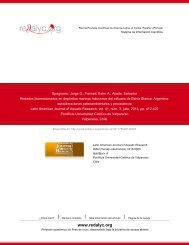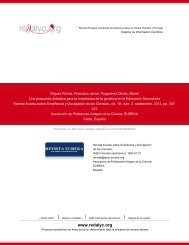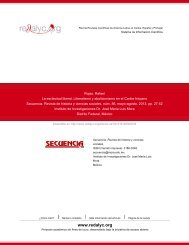A Key Concept in Modern Translation Theory - Redalyc
A Key Concept in Modern Translation Theory - Redalyc
A Key Concept in Modern Translation Theory - Redalyc
You also want an ePaper? Increase the reach of your titles
YUMPU automatically turns print PDFs into web optimized ePapers that Google loves.
82 EQUIVALENCE REVISITED: A KEY CONCEPT IN MODERN TRANSLATION THEORY<br />
Mientras esperaba a que hirviera la <strong>in</strong>fusión, sentado junto a la hornilla de<br />
barro cocido en una actitud de confiada e <strong>in</strong>ocente expectativa, el coronel experimentó<br />
la sensación de que nacían hongos y lirios venenosos en sus tripas. Era<br />
octubre. Una mañana difícil de sortear, aun para un hombre como él que había<br />
sobrevivido a tantas mañanas como ésa. Durante c<strong>in</strong>cuenta y seis años –desde<br />
cuando term<strong>in</strong>ó la última guerra civil- el coronel no había hecho nada dist<strong>in</strong>to de<br />
esperar. Octubre era una de las pocas cosas que llegaban.<br />
Der Oberst hat niemand, der ihm schreibt<br />
Translated by Curt Meyer-Clason (Köln, Kiepenheuer & Witsch 1976)<br />
Der Oberst hob den Deckel der Kaffeebüchse und stellte fest, dass nur e<strong>in</strong><br />
Löffel voll übrig war. Er nahm den Topf vom Herd, goss die Hälfte des Wassers<br />
auf den Lehmfussboden und kratzte über dem Topf mit e<strong>in</strong>em Messer die Büchse<br />
aus, bis sich mit dem letzten Kaffeepulver der Blechrost löste.<br />
Während der Oberst, am Herd aus gebranntem Ton sitzend, <strong>in</strong> unschuldiger<br />
Zuversicht das Aufkochen des Getränks erwartete, hatte er das Gefühl, giftige<br />
Pilze und Schwertlilien wüchsen <strong>in</strong> se<strong>in</strong>en Gedärmen. Es war Oktober. Der<br />
Morgen versprach schwierig zu werden, selbst für e<strong>in</strong>en Mann se<strong>in</strong>es Schlages,<br />
der viele Morgen wie diesen überlebt hatte. Sechsundfünzig Jahre lang –seit<br />
dem Ende des letzten Bürgerkrieges- hatte der Oberst nichts getan als gewartet.<br />
Der Oktober war e<strong>in</strong>es der wenigen D<strong>in</strong>ge, die e<strong>in</strong>trafen.<br />
No one writes to the colonel<br />
Translated by J.S Bernste<strong>in</strong> (New York, Harper & Row, 1968/1999)<br />
The colonel took the top off the coffee can and saw that there was only one<br />
little spoonful left. He removed the pot from the fire, poured half the water onto<br />
the earthen floor, and scraped the <strong>in</strong>side of the can with a knife until the last<br />
scrap<strong>in</strong>gs of the ground coffee, mixed with bits of rust, fell <strong>in</strong>to the pot.<br />
While he was wait<strong>in</strong>g for it to boil, sitt<strong>in</strong>g next to the stone fireplace with<br />
an attitude of confident and <strong>in</strong>nocent expectation, the colonel experienced the<br />
feel<strong>in</strong>g that fungus and poisonous lilies were tak<strong>in</strong>g root <strong>in</strong> his gut. It was October.<br />
A difficult morn<strong>in</strong>g to get through, even for a man like himself, who had survived<br />
so many morn<strong>in</strong>gs like this one. For nearly sixty years –s<strong>in</strong>ce the end of the last<br />
civil war- the colonel had done noth<strong>in</strong>g else but wait. October was one of the<br />
few th<strong>in</strong>gs which arrived.<br />
In the <strong>in</strong>itial sentence it is said that there was just ‘una cucharadita’ of<br />
coffee left. This was translated <strong>in</strong>to German as ‘e<strong>in</strong> Löffel voll übrig war’, that<br />
is, as ‘cucharada’, the opposite of ‘cucharadita’. In the English version this was<br />
rendered as ‘one little spoonful left’, which is actually equivalent to the orig<strong>in</strong>al
















